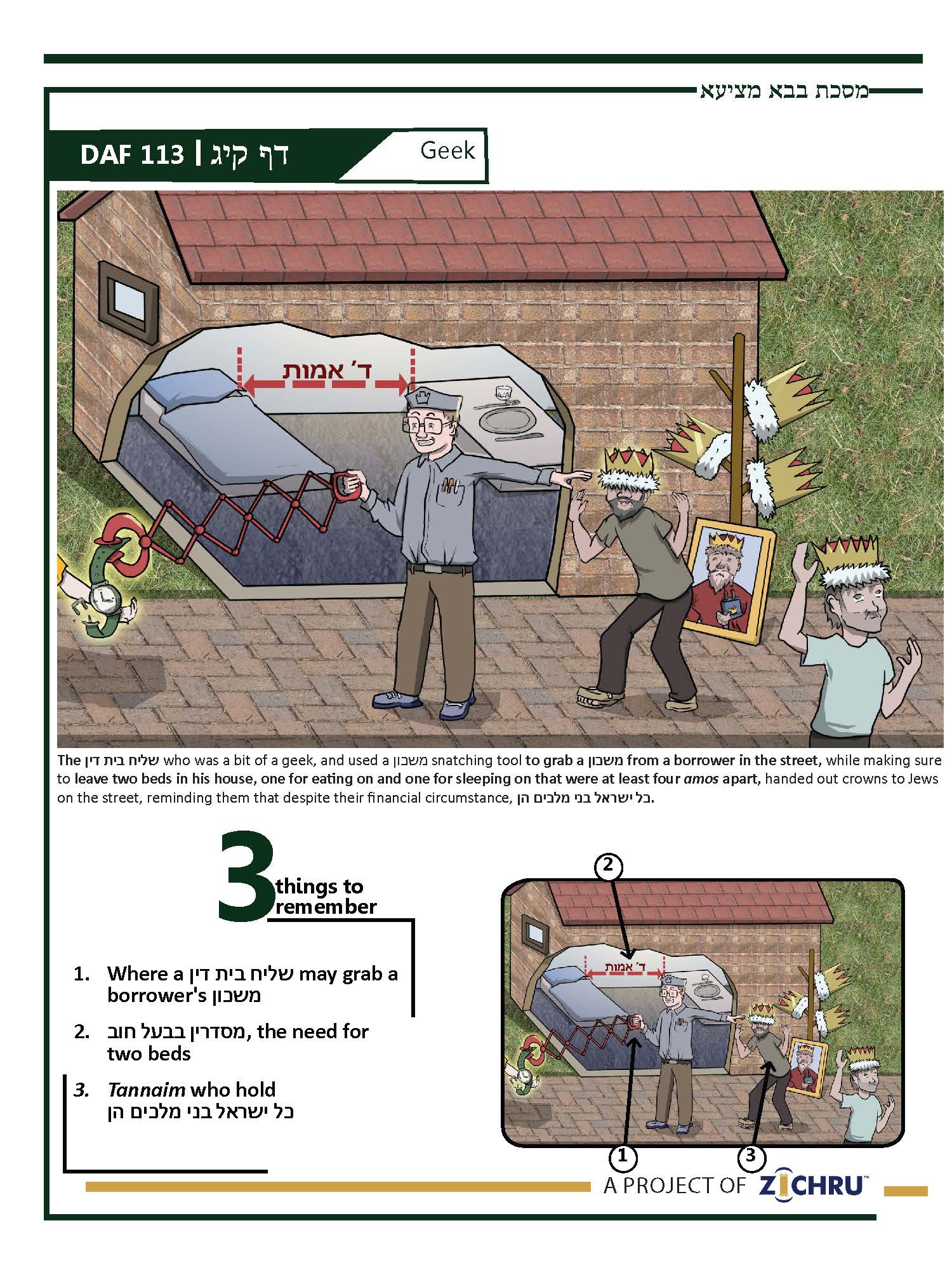Bava Metzia - Daf 113
- Audio Timestamps
0:00 - The 3 Sugyos
2:43 - Review of 3 Sugyos
5:12- Siman
8:03 - 4 Blatt Back Chazarah
15:06 - Pop Quiz (Last 7 blatt)
- For access to all Zichru resources including PDFs, and illustrations CLICK HERE
- A lender or שליח בית דין entering the borrower’s house to take a משכון
The next Mishnah states regarding a lender, לא ימשכננו אלא בבית דין – he may not seize a security from [the borrower] if he fails to pay, except in Beis Din, ולא יכנס לביתו ליטול משכונו – and he may not enter [the borrower’s] house to take a security of his, as the passuk says, "בחוץ תעמד" – you shall stand outside.
Shmuel says: שליח בית דין – an agent of Beis Din מנתח נתוחי אין – may grab a משכון from the borrower in the street, אבל משכוני לא – but he may not seize a משכון by entering his house. After explaining how Shmuel interprets the Mishnah, the Gemara ultimately challenges Shmuel from a Baraisa which explicitly teaches that the passuk "אם חבל תחבל שלמת רעך" – if you shall take the garment of your fellow as security refers to a שליח בית דין, permitting him to enter the house to take a משכון. The Gemara concludes that this question is a machlokes Tannaim.
- מסדרין בבעל חוב, the need for two beds
It was taught in a Baraisa that a שליח בית דין may not take as a משכון any item which the borrower uses to prepare food. ונותן מטה ומטה ומצע לעשיר – And he [allows] him a bed, and another bed with a spread for a wealthy borrower, מטה ומטה ומפץ לעני – and a bed, and another bed with a mat for a poor borrower. Such items are not left for his wife and children. The Baraisa concludes, as the Gemara explains: כדרך שמסדרין בערכין – Just as we make an assessment for arachin to allow him basic living needs, כך מסדרין בבעל חוב – so too we make an assessment for a borrower. [This is a machlokes Tannaim] Since beds are not left for his family members, both beds must be for the borrower himself. The Gemara explains that one bed is for eating on, and the other is for sleeping. These are necessary because of Shmuel’s statement: כל מילי ידענא אסותייהו – I know the cure for all [maladies], except for three: (1) one who eats a bitter date on an empty stomach, (2) one who ties a damp flax rope around his hips, (3) and one who eats bread and does not walk four amos before going to sleep. Therefore, one needs a separate bed for eating.
- Tannaim who hold כל ישראל בני מלכים הן
Abaye listed four Tannaim who hold כל ישראל בני מלכים הן – all people of Yisroel are like princes. (1) Rabban Shimon ben Gamliel: a Mishnah teaches that one may not move raw luf (a bean) or mustard on Shabbos, because they are muktzeh. Rabban Shimon ben Gamliel allows moving luf, because it is food for ravens. Although ravens are only pets for the wealthy, Rabban Shimon considers them fit for all of Yisroel, whom he considers like royalty. (2) Rebbe Shimon: a Mishnah teaches that princes may rub rose-oil on their wounds on Shabbos, because they anoint themselves with it during the week, not as medicine. Rebbe Shimon says: כל ישראל בני מלכים הן – all people of Yisroel are like princes and rose-oil is considered fit for them as well. (3) Rebbe Yishmael and Rebbe Akiva: a Baraisa teaches that if one owes a thousand zuz, and was wearing a cloak worth ten thousand zuz, we take it off him and clothe him in a cloak befitting him. Baraisos teach in the names of Rebbe Yishmael and Rebbe Akiva: כל ישראל ראוין לאותה איצטלא – all people of Yisroel are fit for that luxurious cloak.
Siman – Geek
The שליח בית דין who was a bit of a geek and used a משכון snatching tool to grab a משכון from a borrower in the street, while making sure to leave two beds in his house, one for eating on and one for sleeping on that were at least four amos apart, handed out crowns to Jews on the street, reminding them that despite their financial circumstance, כל ישראל בני מלכים הן.


